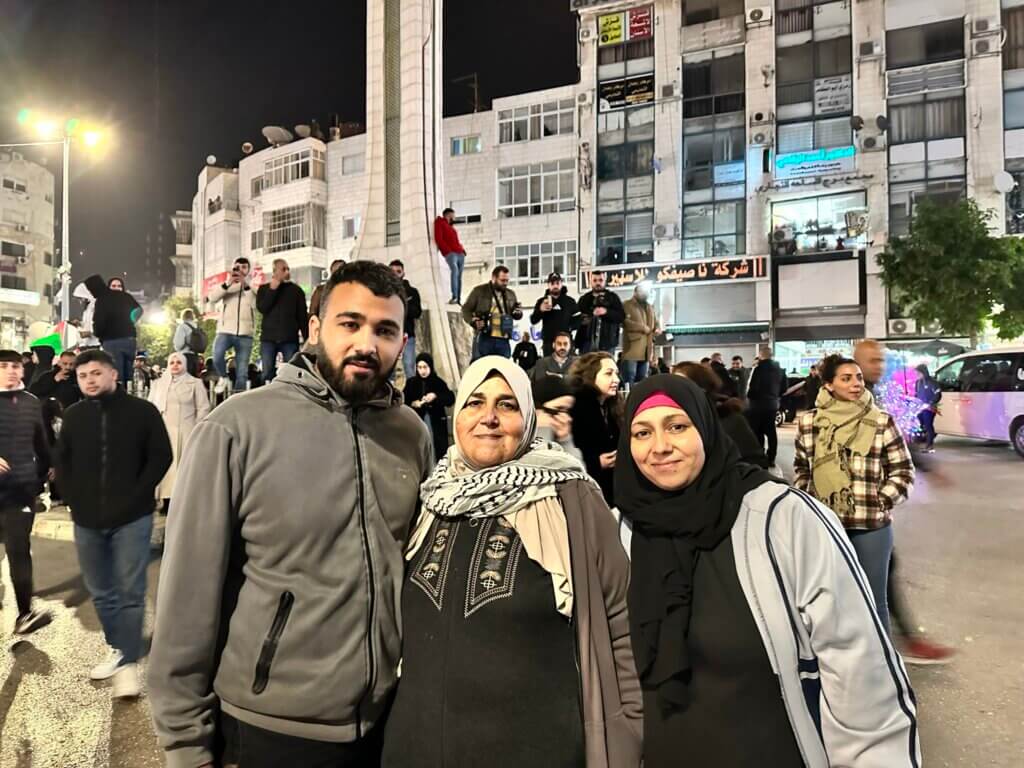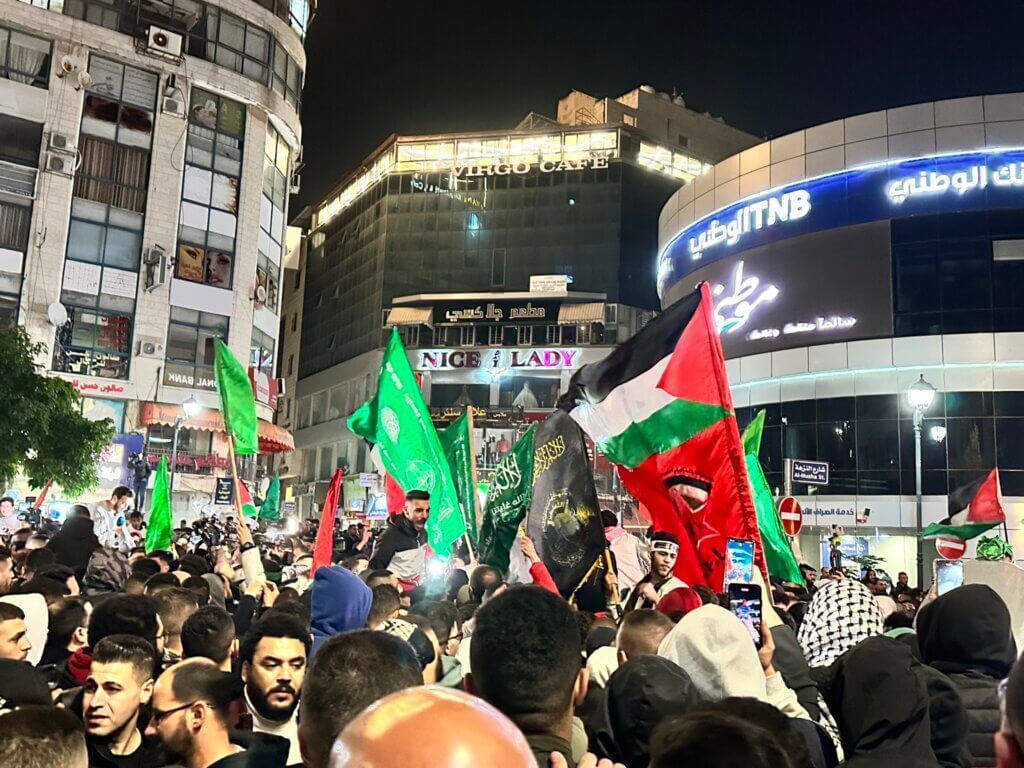Dancing with broken hearts for the Palestinian children being freed

On Sunday evening in the occupied West Bank, hundreds of people gathered in the middle of Ramallah to welcome Palestinian children set to be freed from Israeli jails for the third consecutive day.
Youth climbed atop the central roundabout waving flags as families posed with peace signs for pictures amid the sea of keffiyehs, smiling as they waited for the freed children to arrive.
Anticipation filled the air. With every false alarm that the prisoner bus arrived, the crowd of people would jump in its direction, craning their necks to get a good look at the scene.
Among them was a woman who proudly proclaimed that she was the mother of 17-year-old Ahmad Qadri Shiyha, one of 39 Palestinian children set to be released that day.
“The first thing I want to do is hug him; I haven’t been allowed to touch him in a year,” she told Mondoweiss, adding that she only found out hours before that her son would be released.
On November 27, 2022, almost exactly a year ago to the day, Israeli forces stormed Shiyha’s family home during a night raid and arrested him.
“[The Israeli army] took him in the middle of the night while he was asleep. I had a heart attack; he was so young,” Shiyha’s mother told Mondoweiss.
The number of soldiers raiding her home was an almost comically large group composed of foot soldiers and military jeeps, as if her son was a high-ranking official rather than a teenage boy asleep in his bed, she added.
Shiyha’s sentence was one year and eight months; however, he was one of the lucky political prisoners chosen for an early release in line with the temporary four-day truce between Hamas and Israel, which has since been extended to six days.
Since his arrest, Shiyha’s mother has had difficulties sleeping at night as she lies awake thinking about his return, explaining that Israeli forces subjected her son to harsh treatment, humiliation, and solitary confinement, all the while denying him basic necessities.
“It broke me seeing my child sitting in front of me crying and living through such a painful ordeal,” she said, “I only wished to touch his hand, but [the prison guards] wouldn’t allow me to.”
His mother found out only hours before that her son would be among the 150 Palestinian children and women released in return for 50 captives held in Gaza over four days.
An additional 20 Israeli captives and 60 Palestinian prisoners are likely to be released during the truce extension.
As wide-eyed kids sat on their parents’ shoulders, watching her speak, she said, “When I saw his name on the list, I couldn’t believe it.”
After a couple of hours of waiting, just after 9:00 pm, the bus from Ofer prison finally arrived.
The crowds cheered, charging in its direction and momentarily leaving misery behind them as they paraded the young boys, draped in various flags around the square, chanting for the freedom of Palestine and in honor of Palestinian resistance as teary-eyed mothers were finally allowed to hug their sons.

‘A collective experience’
The struggle of political prisoners resonates deeply with the Palestinian population, as it is a core part of Israel’s ongoing military occupation and apartheid system to assert its dominance while suppressing Palestinian sovereignty and resistance.
There are currently 7000 Palestinians being held in Israeli prisons, over 3,160 of whom have been arrested after October 7, since the Israeli army began a large-scale arrest campaign across the occupied West Bank and East Jerusalem, according to the Palestinian Prisoners Club.
2070 are administrative detainees who are being held indefinitely on “secret evidence” without charge or trial.
“Each year, approximately 500-700 Palestinian children, some as young as 12 years old, are detained and prosecuted in the Israeli military court system. The most common charge is stone throwing,” reported Defense for Children Palestine.
While the families of the freed Palestinian prisoners celebrate the return of their loved ones, it is being felt as a collective victory and a historical moment for Palestinians.
Mayar, a 21-year-old English literature student at Bir Zeit University, told Mondoweiss, “I am here because [Palestinian people] are all one. Our happiness is one, and our sadness is one.”
“This is the first time in my life that I am witnessing something like this, watching our prisoners be released because of the will of our people in spite of our jailers,” she said, explaining that she felt like she may never have the chance to witness something like this again.
Similarly, Jerusalem-based Palestinian activist Adnan Barq, 23, noted the contrast between the celebrations for the prisoners in the occupied West Bank and those in Jerusalem, remarking on the value of a collective celebration.
In Jerusalem, Israel has made it illegal for Palestinians to celebrate the release of the prisoners, meaning any festivities can result in “insane” legal ramifications.
According to the Palestinian Prisoner Club, just handing out candy can end in a 70,000 Israeli shekels ($18,700) fine for handing out candy.
“It feels like an individual experience for every family in Jerusalem- you can’t even bring the press to your home,” Barq said, “but [in the West Bank] you can see it is a collective experience.”
He added that it is one of the ways Israel has fragmented the Palestinian struggle across the occupied territories.
“In the West Bank, people are scared of settlers and occupation forces; in Gaza, people are afraid of the bombs genociding their families; in Jerusalem, we are afraid to be arrested for social media posts; and in the north, people are afraid just for being Palestinian.”
“But now, we are all united by the images of parents being reunited with their children. It is heartwarming, but it is also so sad since many Gazans are losing their children. We have a moral crisis.”

‘We are dancing with broken hearts.’
While everybody marched, laughed, and clapped together, chanting in honor of the Palestinian prisoners, it was a bittersweet victory in light of the thousands of prisoners still in jail as well as Israel’s ongoing genocide in Gaza, which still has no end in sight.
Shiyha’s mom said it is a great feeling to know that her son is getting out, but at the same time, she is “sad for the children of Gaza and all the martyrs” and posed the question, “how can we be happy when there still other prisoners being beaten and humiliated?”
Still, the collective consensus is that everybody was there with a heavy heart and the knowledge that Palestinian happiness and strength are invaluable tools against the occupation.
“We are dancing with broken hearts. We are not out of touch and very joyful,” said Barq.
“This prisoner release is a win for Gaza and for all the Palestinian people. We will continue to resist for our people, and at the same time, we will be happy as long as this happiness disturbs the occupation,” Mayar added.
“I feel like happiness here is not coming from the heart; it is performative; it’s sending a message to the occupation that we are unbreakable even though we are broken. Maybe this is the kind of pride that has allowed us to survive 75 years of genocide,” Barq concluded.
Before you go – we need your support
At Mondoweiss, we understand the power of telling Palestinian stories. For 17 years, we have pushed back when the mainstream media published lies or echoed politicians’ hateful rhetoric. Now, Palestinian voices are more important than ever.
Our traffic has increased ten times since October 7, and we need your help to cover our increased expenses.


No comments:
Post a Comment